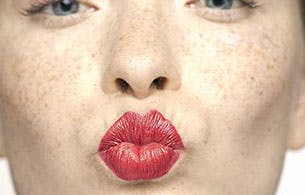Back to Dealing with Cold Sores articles


A GUIDE TO COLD SORE TREATMENTS: AT-HOME AND OTC REMEDIES
If you get a painful cold sore, you don’t have to let it sideline you. Taking the right steps as soon as possible can help reduce discomfort and shorten the duration and healing time of painful cold sore symptoms.
What Are Cold Sores?
Cold sores are an outbreak of the herpes simplex virus (HSV).1 They are small blisters, often in a cluster, that usually develop on the lip or around the mouth.1 A cold sore will feel like a tingling, itching or burning feeling around the lips, before developing into one or more painful blisters over the next 48 hours.2
More than half of Americans between the ages of 14 to 49 carry the virus that causes cold sores.1 Even after the cold sores clear, HSV stays in the body and can reactivate, causing cold sores again.1
Five Steps for Treating Cold Sores At Home
Fortunately, cold sores are generally not serious, and they tend to clear within two weeks.1 They can easily be treated at home with these simple steps:
Step 1: Act Quickly with Medication
The best way to help a cold sore heal faster is by applying Abreva® Cold Sore Cream as soon as you feel the onset of a cold sore. Abreva® Cream starts to work immediately to block the virus. Abreva Cream’s 5-in-1 multi-symptom cold sore relief† provides fast healing and relief from pain, itching, burning and tingling. Its active ingredient, docosanol, can help heal a cold sore in as few as 2½ days when used at the first sign.*
Step 2: Take Away the Pain
Use a pain reliever to lessen the painful effects of a cold sore. Abreva Rapid Pain Relief is a clear gel that contains a powerful analgesic to temporarily numb your pain while your cold sore heals. Its active ingredient, maximum-strength lidocaine, provides pain relief until your cold sore heals. The gel also contains glycerin, which hydrates to prevent cracking.
Step 3: Cool Your Lip Down
Apply a cold compress to ease symptoms and avoid your lips from drying out or crusting.4
In addition, Abreva Rapid Pain Relief’s inactive ingredient, menthol, provides cooling relief.**
Step 4: Avoid Irritating Foods and Drinks
Steer clear of foods that are likely to irritate a cold sore. Avoid foods that are salty, spicy or acidic, as these can make your cold sore feel worse.2 However, it’s still important to drink plenty of fluids to avoid dehydration.2
Step 5: Don’t Touch!
Resist the temptation to pick at it because you may cause reinfection.3 If you accidently touch it, don’t touch any other body parts.2 Be sure to wash your hands as soon as possible to avoid spreading it to another area or to somebody else.2
What to Avoid If You Have Cold Sore Symptoms
Cold sores are contagious from the moment you first feel the tingle until they are completely healed, and they can easily spread to others.2 To help protect those around you, remember the following tips:
- Don’t share items.3 Avoid sharing any items that may have come in contact with your cold sore, especially towels, silverware or makeup when you are experiencing symptoms.3
- Avoid kissing or oral sex.2 Avoid kissing anyone from the moment you first experience symptoms until the cold sore is completely healed.2 You could potentially give your partner genital herpes if you have oral sex before your cold sore is completely healed.2
- Reduce stress.3 Stress can reactivate the cold sore virus, causing further outbreaks.3 If your cold sores are brought on by stress, try relaxation techniques, such as meditation or deep-breathing exercises.4
- Don’t touch your cold sore.2 Other than applying products like Abreva Cold Sore Cream to treat your cold sore, you should avoid touching it altogether. If you need to touch your cold sore while applying medication, be sure to wash your hands before and after doing so.2
Over-the-Counter Cold Sore Treatments
Although these remedies may provide temporary symptom relief or minimize bacterial infections, home remedies for cold sores are not necessarily a cure-all. However, Abreva® Cream can help. Abreva® is an over-the-counter product that has been proven to reduce healing time of cold sores when used at the first sign of a cold sore.
*Median healing time 4.1 days. 25% of users healed within 2.5 days.
**Use as directed. Abreva Cream and Abreva Rapid Pain Relief are not intended to be used together.
†Can relieve symptoms when used at the first sign. Use as directed.
SOURCES
- Cold Sores: Overview. American Academy of Dermatology Association. https://www.aad.org/public/diseases/a-z/cold-sores-overview/. Accessed 9/16/2024.
- Cold Sores. National Health Service. https://www.nhs.uk/conditions/cold-sores/. Accessed 9/16/2024.
- Cold sore remedies dermatologists recommend. American Academy of Dermatology Association. https://www.aad.org/public/diseases/a-z/cold-sores-self-care/. Accessed 9/17/2024.
- Cold sore. Mayo Clinic. https://www.mayoclinic.org/diseases-conditions/cold-sore/diagnosis-treatment/drc-20371023/. Accessed 9/17/2024.






